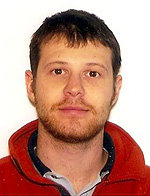Law School Clinches First, Second, Third in Elder Law Writing Competition
Papers on dying without a will, the right to die, and retirement securities took the top three spots at the National Academy of Elder Law Attorneys (NAELA) writing competition — and all of them were written by UVA law students. Their articles will be published in the NAELA Student Journal, which is published annually and they will be recognized at the Fall 2007 NAELA Institute in Memphis, Tennessee, this November. The competition is held each year to encourage law students to learn more about elder law and gain a deeper understanding of the field.

Shelly Harris '08 will receive a $1,500 cash prize for her article, which took first place. Her paper on grandparents who are the primary caregivers to their grandchildren and who die intestate, or without a will, delved into solving the problem of protecting the grandchildren after the grandparents die. There is not very much protection for the grandchildren in these situations in the Unites States, she explained. She argued for a limited form of the family maintenance system that is used in other common law countries such as England and Australia, which gives judges some discretion to utilize the funds of the decedent's estate to support persons who would not otherwise receive support under the intestate laws or the decedent's will.
"I suggested that a system that only applied to intestate estates as opposed to people who died with wills in place would be more acceptable in this country. A lot of the criticism of these systems has to do with the fact that they can overrule people's wills, which we really don't like the idea of doing here in the United States. So I said if they applied only in intestate situations it would be better received in this country."
Harris developed an interest in trusts and estates over the years beginning while she was a paralegal in Washington, D.C., before law school. She'll work in the private wealth department at Arnall Golden Gregory LLP in Atlanta after graduation.

Jonathan Lasken's, article on the incoherent right to die earned him second place and a $1,000 cash prize. In the public discourse on the right to die, some, including the Supreme Court have suggested, that they might consider allowing someone in a lot of pain to exercise their patient autonomy to make the decision to end their own life. Lasken argued that they are not considering the contradictions involved with that sort of thinking.
"There's a paradox or mistake there because, at least in medical literature and in other fields, they've acknowledged that you can't have pain and autonomy simultaneously. When you're in a lot of pain, you can't think rationally and you can't make decisions," he said. "You can't really believe what people say when they're in pain because they say whatever they need to say to get out of pain."
The idea for the article came about when his Aging and the Law class with Professor Thomas White discussed autonomy and the right to die. He recalled a similar debate about people who are tortured from a class he took with visiting professor Austin Sarat called Punishment in Law and Culture.

Scott Dorfman '07 took third place and will receive a $500 prize. He argued that expanding tax favored vehicles would not increase the overall savings rates of Americans. His argument was based on recent proposals by Congress to increase the amount of money that higher income Americans could save in tax favored accounts.
"I argued that it wasn't a good idea to create these lifetime savings accounts or to raise the income limitations for Americans to contribute to Roth IRAs," he said. "Expanding these tax favored vehicles wouldn't increase the savings rate; it would just allow people who were going to save anyway to do it without a tax penalty when they draw on their accounts at retirement. Those revenues could be very important when Social Security is operating at a loss in the future," he said.
Dorfman is currently an associate at Fredrickson & Byron, PA in Minneapolis, MN, working on wind energy and corporate law.
Dorfman is proud of the fact that he and his classmates took the top three spots in the competition. "I think it shows that UVA has a great commitment to student writing and the Dillard Fellows Program. They really encourage students to become good legal writers. It shows that UVA is a national leader in teaching people to write well."
Professor Thomas White, who teaches the seminar on Aging and the Law, supervised the students in class and helped them get their papers ready for submission. "Achieving this recognition by a national organization is the students' accomplishments. Individually, they took the initiative to submit their papers to NAELA, including revising and rewriting some parts of their papers. Their success does reflect well on the opportunities these seminars, which deal with aging and retirement, offer to students to work on important problems to an aging society. These student written pieces are very good papers," he said.
Founded in 1819, the University of Virginia School of Law is the second-oldest continuously operating law school in the nation. Consistently ranked among the top law schools, Virginia is a world-renowned training ground for distinguished lawyers and public servants, instilling in them a commitment to leadership, integrity and community service.


